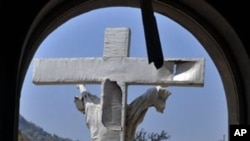The latest in a series of church attacks in northern Nigeria left six dead and 10 wounded outside of Kano on Thursday. The radical Islamist sect Boko Haram is suspected of the attack, and of pushing the country toward religious conflict.
The attack began when gunmen opened fire during a service at the Deeper Life church in Nasarawa. Theresa Munyok says that her father and her brother were among the dead.
"The only thing I heard was my mommy shouting," Munyok said. "She told me that it was gunshots and that my dad is not even breathing. She called and called and he did not wake up."
A purported spokesman for Boko Haram issued a warning on Sunday that said Christians had three days to leave the Muslim-majority north. A day earlier, Nigerian President Goodluck Jonathan declared a state of emergency in 15 locations across the north after months of deadly bombings and shootings, including several attacks for which Boko Haram claimed responsibility.
The size, structure, and leadership of Boko Haram are all unclear, but some analysts say the goal of the militant group is to provoke Nigeria's Christians into an all-out war.
Mujahid Dokubo-Asari, a Muslim leader in the Christian-majority south told Reuters news agency on Thursday that Nigerian Christians are not above retaliation and that he has seen what they are capable of during a rebellion that he led in 2004.
"We are on the precipice of a civil war, if they continue [the bomb attacks], whether they like it or not. The first retaliation took place in the south-south."
Dokubo-Asari led the Niger Delta People's Volunteer Force, whose attacks on oil pipelines have ceased as a result of peace deals with the government. He implied that he is loyal to the south and to President Goodluck Jonathan, a Christian and a southerner.
"It is just Goodluck that is holding us, they should know, if anything happens to Goodluck, that same day, we are not bursting pipes, we are moving to Abuja."
At least 37 were killed in a Christmas Day bomb blast just outside of Abuja.
The capital city in the center of Nigeria is on the de facto dividing line between the Muslim north and the Christian south, whose numbers are nearly even in the country's population of 160 million. Many fear it may also become the Nigeria's battle line.




